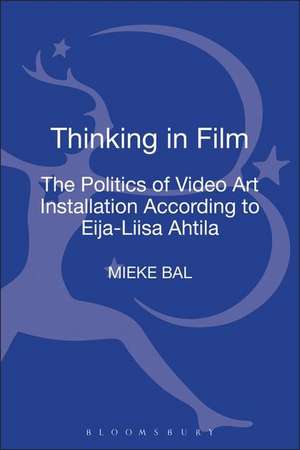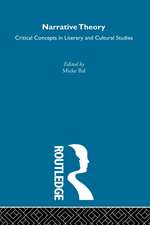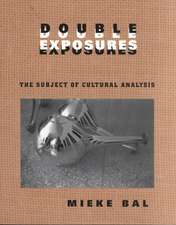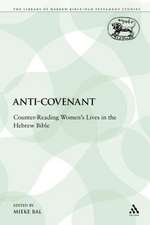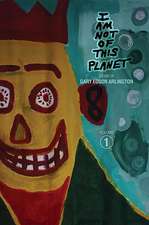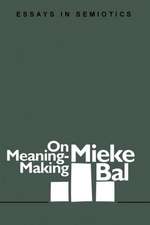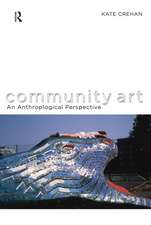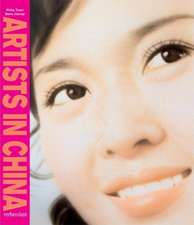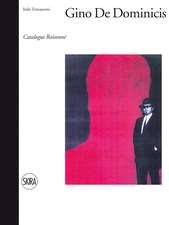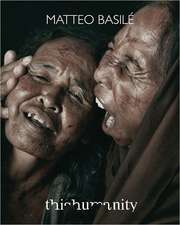Thinking in Film: The Politics of Video Art Installation According to Eija-Liisa Ahtila
Autor Mieke Balen Limba Engleză Hardback – 19 iun 2013
| Toate formatele și edițiile | Preț | Express |
|---|---|---|
| Paperback (1) | 191.26 lei 6-8 săpt. | |
| Bloomsbury Publishing – 19 iun 2013 | 191.26 lei 6-8 săpt. | |
| Hardback (1) | 570.83 lei 6-8 săpt. | |
| Bloomsbury Publishing – 19 iun 2013 | 570.83 lei 6-8 săpt. |
Preț: 570.83 lei
Preț vechi: 728.56 lei
-22% Nou
Puncte Express: 856
Preț estimativ în valută:
109.26€ • 112.59$ • 92.24£
109.26€ • 112.59$ • 92.24£
Carte tipărită la comandă
Livrare economică 01-15 martie
Preluare comenzi: 021 569.72.76
Specificații
ISBN-13: 9781472526915
ISBN-10: 1472526910
Pagini: 328
Ilustrații: 59
Dimensiuni: 138 x 216 x 20 mm
Greutate: 0.61 kg
Editura: Bloomsbury Publishing
Colecția Bloomsbury Academic
Locul publicării:London, United Kingdom
ISBN-10: 1472526910
Pagini: 328
Ilustrații: 59
Dimensiuni: 138 x 216 x 20 mm
Greutate: 0.61 kg
Editura: Bloomsbury Publishing
Colecția Bloomsbury Academic
Locul publicării:London, United Kingdom
Caracteristici
Of interest and relevance to thinkers and practitioners rights across the arts and humanities
Notă biografică
Mieke Bal is the author of Reading Rembrandt: Beyond the Word-Image Opposition, Narratology: Introduction to the Theory of Narrative, and many other books. She is Professor of the Theory of Literature at the University of Amsterdam, and has also been affiliated with Columbia University, the University of Rochester, and Cornell University, USA.
Cuprins
Introduction:Thinking In Film1. Exhibition2. Work: Meaning3. Installation: Threshold 4. Narrative 5. Genre: Contact SpacesImage: An Epilogue
Recenzii
Thinking in Film sweeps aside disciplinary convention to uncover a whole new way of thinking about thought. Turning the form of the artist monograph inside out, Mieke Bal brilliantly derives from the work of Eija-Liisa Ahtila the most replete account yet of the process by which ideas are actualized in the medium of the moving image.
Thinking in Film is the most compelling analysis of Eija-Liisa Ahtila's art to date. It is a contribution to thinking by extending the ideas of what is presentable, perceivable and thus knowable. Mieke Bal draws from the constitutive conceptual and theoretical underpinnings of audio-visual installation art and gallery film but, importantly, develops her thinking further through a close analysis of the artworks. Bal shows how viewers are affected by the audio-visual realm but also left space to exert their own agency. The book demonstrates how art matters as a critical practice that has wider socio-cultural and political relevance.
The breadth and scale with which she builds her analysis is overwhelming. Rarely have I come across such a minute and sensuous reading of this art form.
Thinking in Film is the most compelling analysis of Eija-Liisa Ahtila's art to date. It is a contribution to thinking by extending the ideas of what is presentable, perceivable and thus knowable. Mieke Bal draws from the constitutive conceptual and theoretical underpinnings of audio-visual installation art and gallery film but, importantly, develops her thinking further through a close analysis of the artworks. Bal shows how viewers are affected by the audio-visual realm but also left space to exert their own agency. The book demonstrates how art matters as a critical practice that has wider socio-cultural and political relevance.
The breadth and scale with which she builds her analysis is overwhelming. Rarely have I come across such a minute and sensuous reading of this art form.
